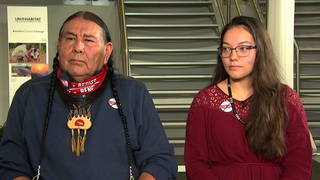
Across the United States on Monday, protesters took to the streets in hundreds of rallies urging President Obama to reject the Keystone XL tar sands oil pipeline. The actions in at least 44 states followed a State Department report claiming the pipeline’s northern leg would have a minimal impact on the local environment and climate change. Environmentalists disagree, saying plans to pipe 830,000 barrels of oil per day from Alberta’s tar sands to the U.S. Gulf Coast would accelerate global warming and threaten communities along the pipeline’s route. Here in New York City, Bill McKibben of 350.org and Clayton Thomas-Muller of the Indigenous Tar Sands Campaign spoke out on Monday night at a vigil at Union Square.
CLARA VONDRICH: So we’re here today to band together. We’re all so grateful that you made it out in the blustery cold. In just two days, we’ve organized 200 groups around the country after the State put out its final environmental impact statement. And despite the fact that it recognizes that tar sands have 17 percent more carbon emissions than regular old crude, they still say that this pipeline won’t make a difference. And we’re here to say, “No, that’s not true. This pipeline will make a difference, and we have to stop it.”
PROTESTERS: No KXL! No KXL! No KXL! No KXL! No KXL! No KXL!
BILL McKIBBEN: The State Department released their long-awaited final environmental impact statement. This one didn’t do what all the ones before had done and say that there would be no significant environmental impact from Keystone. Nobody believes that anymore. In fact, the report said that in a scenario where you tried to do something about climate or you tried to constrain carbon, then this would be a serious problem, this pipeline bringing 800,000 barrels of oil a day down from Canada. That might seem obvious to you, I or anybody else who looks at it, but that’s what it’s taken years to get these guys to even begin to admit.
There are a million—a million—nodes of resistance all over this country and all around this world, and this fight over Keystone is one of these places. We’re not going to win the battle against global warming by stopping Keystone, but we are going to show that the fossil fuel industry doesn’t always get its way.
This issue has already brought more Americans into the streets than any environmental issue in decades, and now, finally, we’re at the point of decision. It’s out of the hands of the bought-off bureaucrats who have been delaying it in the State Department for years and doing the bidding of the fossil fuel industry. Now we’re going to find out whether John Kerry and Barack Obama are similarly captives of the oil industry or whether they’re willing to really stand up when it counts for the commitments they’ve made about climate change.
CLAYTON THOMAS-MULLER: When I say, “Idle,” you say, “No more!” Idle!
PROTESTERS: No more!
CLAYTON THOMAS-MULLER: Idle!
PROTESTERS: No more!
CLAYTON THOMAS-MULLER: Idle!
PROTESTERS: No more!
CLAYTON THOMAS-MULLER: Each and every single one of you is part of the emergence of the biggest social movement in the history of the members of the five-fingered nation, the human race. And so, I commend you. Now this fight against tar sands and its associated infrastructure has been a fight that has gotten a lot of attention lately, but it’s been a fight that indigenous peoples on the front line of Obama, of the United States of America’s energy policy, of the Canadian government’s energy policy, and these people have been resisting unsustainable development for decades. We do not want this KXL. We do not want tar sands in our lands. If we don’t focus at least 40 to 50 percent of our efforts to supporting communities on the front line in northern Alberta, and the tar sands continue to expand, then our grandchildren’s children will be campaigning against pipelines and shipping lanes and refinery upgrades for this dirty oil.












Media Options